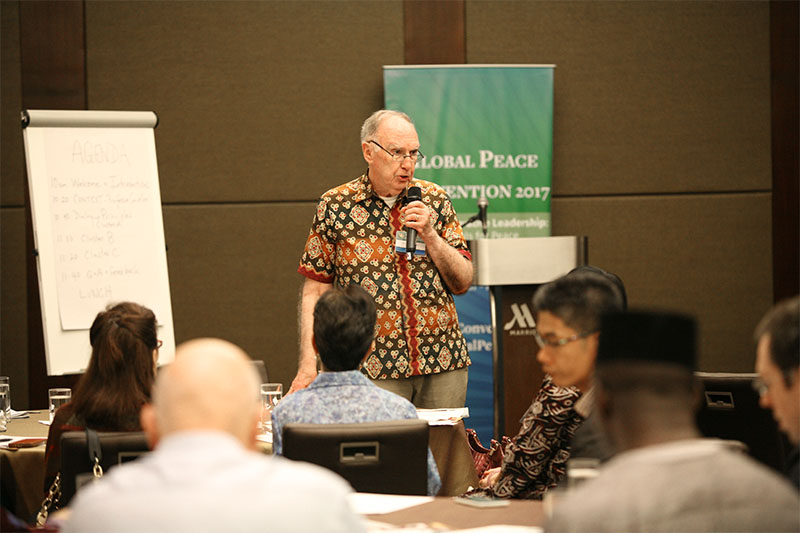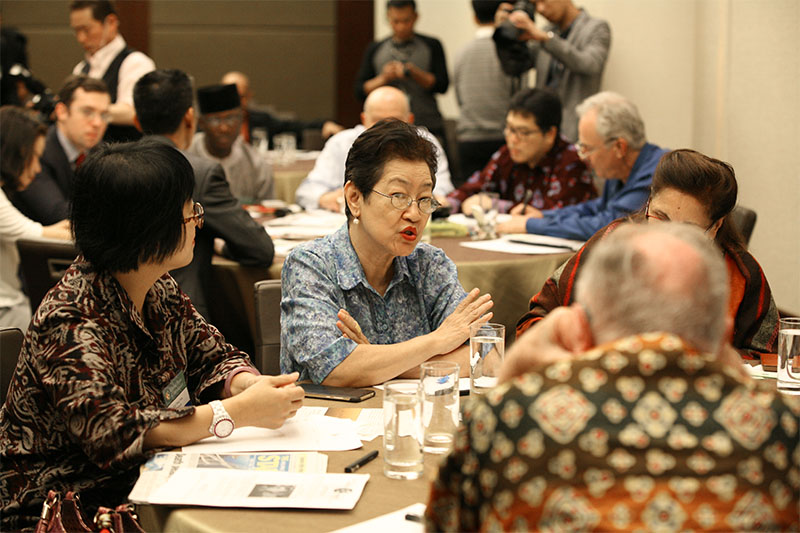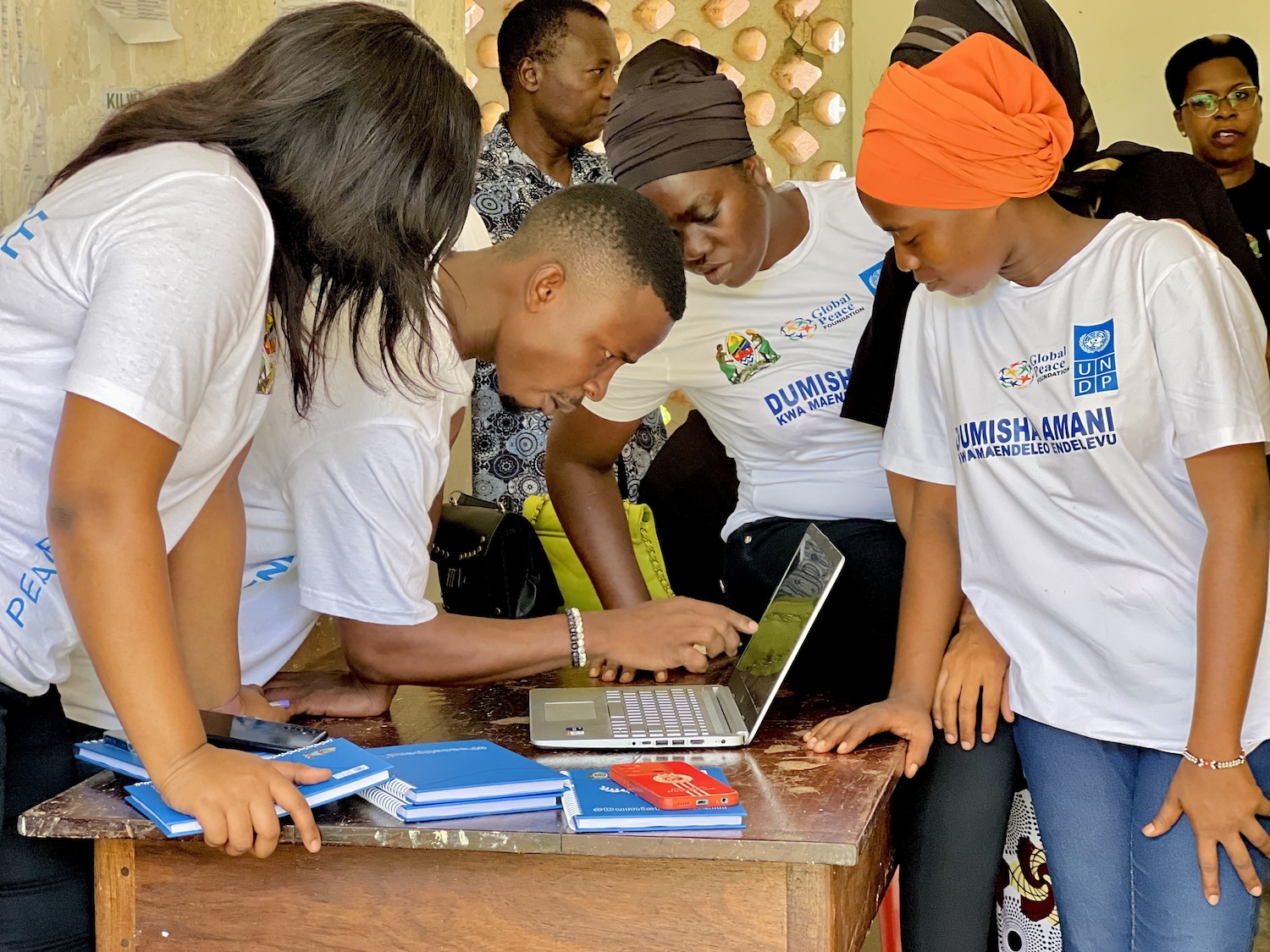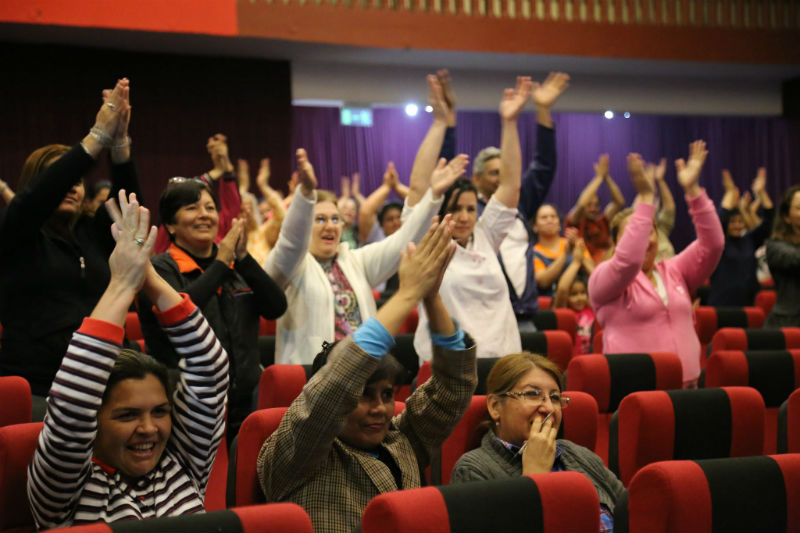In a full-day, capacity training workshop run by the Dialogue Institute, participants of the Global Peace Foundation’s post-convention program gathered on March 4, 2017 to learn more about the global ethic and the “essentials of peacebuilding.”
Dr. Leonard Swidler, founder of the Dialogue Institute, opened the day with the story and hopes behind the 1993 Declaration Towards a Global Ethic signed at the Parliament of the World’s Religions in Chicago, Illinois. As one of the most notable and active scholars having worked to advance the global ethic, Dr. Swidler shared on the history as well as his hopes for the ongoing work to create inclusive, ethical societies and for the well-being of all humanity.

Dr. Swidler opens the Peacebuilding workshop in Manila
In the post-Cold War era, as the world started to recognize a sense of deep interconnectedness as a global community, Dr. Hans Kung began to write on the need to build a global ethos and shared ethic in order to confront the challenges of what we now call globalization. As a long-time friend and colleague of Dr. Kung, Dr. Swidler and Dr. Kung worked to promote and advance the global ethic to where we are today.
Dr. Jonathan Keir of the Weltethos Institute in Tubingen, Germany, represented the work of Dr. Kung and his view that “a common ethic already exists within all the religious teachings of the world. This can supply the moral foundation for a vision to lead men and women away from despair, and society away from chaos.” Dr. Keir elaborated on Dr. Kung’s original intent behind the Global Ethic project, which was essentially to develop a world ethos, or a global spirit of community among people regardless of racial, religious or national identities.
Taken together, the work to advance a world ethos and a global ethic so necessary to our interconnected global community are closely related to the work of the Global Peace Foundation. GPF has worked to promote these ideas in calling attention to a common vision, articulating universal principles and building a consensus around shared values as the basis for peace in our world.
As an important part of helping this work to take root at the grassroots, the Dialogue Institute, together with the Global Peace Foundation, worked to share the principles of dialogue and relationship-building to a wide variety of community leaders gathered at the workshop.
“A common ethic already exists within all the religious teachings of the world. This can supply the moral foundation for a vision to lead men and women away from despair, and society away from chaos.”
Rebecca Mays, Executive Director of the Dialogue Institute, directed the participants, who were seated in small “affinity groups” to discuss the Ten Principles of Dialogue as set out by Dr. Swidler and the Institute. A remarkably diverse group of participants shared personal stories of growth and dialogue and grappled over the issues of the day.
The recipients of this year’s Global Peace Award, Sheikh Abdulahi Maraya and Rev. Joseph Hayab, from Nigeria shared a story about their role in mitigating conflict surrounding local State elections in which religious identity was put forth as more important than character, competency or experience. In a light-hearted moment, Rev. Hayab joked, “When you’re getting on a plane, does it matter to you whether the pilot is a Christian or a Muslim or that he is experienced and trained as a pilot?”
Discussions on this and other stories followed, using the “Ladder of Inference,” “Polarity Map” as well as the “Principles of Dialogue” to shed light on our assumptions, beliefs and to encourage new, creative ways to resolve conflict or misunderstanding.

Participants discuss at the Essentials of Peacebuilding workshop
Following the program, Dr. Chandra Setiawan, Chairman of GPF Indonesia, Coordinator of the Supreme Council of Confucian Religion in Indonesia, and the Founder of the Indonesian Conference on Religion and Peace reflected that the story that the ‘Kaduna twins’ recounted paralleled the challenges Indonesians face today in terms of the election of the current Chinese-Christian mayor of Jakarta. Dr. Chandra expressed his appreciation for the peacebuilding workshop, “The metric they used is very good to educate people to check whether they are [basing election decisions] on the character or experience [of the leader].” While it was important to maintain the right to freedom of expression, Dr. Chandra felt that the tools he gained to articulate and map out the conflict and ways to resolve it would be important in his work when he returned home.
A co-founder of the Peacemaker’s Circle Foundation based in Manila, Philippines, Dr. Shakuntala Vaswani reflected:
I was excited and humbled to meet Dr. Leonard Swidler, a world authority on Interfaith Dialogue and Global Ethics. The workshop on Essentials for Peacebuilding reinforced [my] understanding of the Decalogue of dialogue and I appreciate the interactive way Rebecca May conducted the workshop.
Other participants felt engaged and determined to bring the lessons learned in the course of the day to their peacebuilding work. Professor Pablito Baybado, Jr., Coordinator for the Uni-Harmony Partners in Manila and Secretary-General of the Religions for Peace, Asia region, reflected:
I think it was an excellent approach that we have [Dr.] Leonard Swidler [direct] the workshop. His lucid and simple presentation of the discourse and need for a global ethic, blended with his openness, in my view, has provided the landscape for a welcoming, tolerant and free discussion. I would like to take note also of the very wide representation of various schools of thought and faith traditions. I consider the shadings and discussions very enriching. Though I think we have difficulty arriving at consensus due to limited time, the free-discussion gave us the inspiration to continue the discussion in whatever means we can.
In building One Family Under God, the principles of dialogue and the meaningful discussions around them become important resources for building understanding across lines of difference. The Essentials of Peacebuilding workshop run by the Dialogue Institute was a fitting conclusion to the interfaith peacebuilding programs held during the Global Peace Convention.



